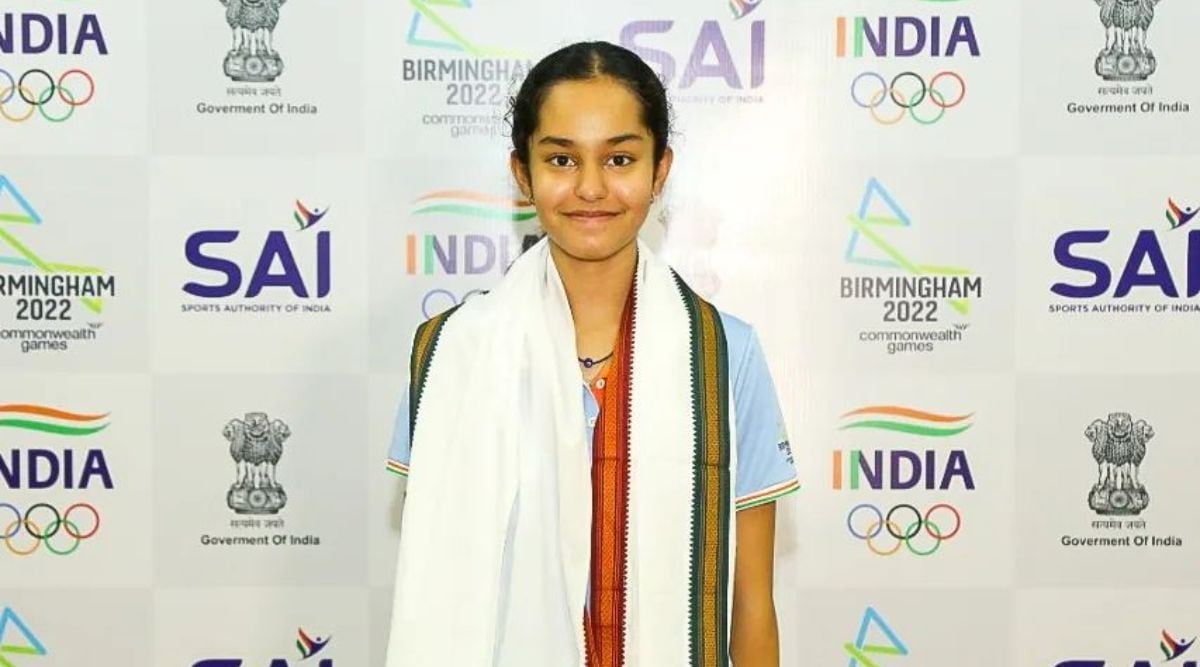Meet 14-year old squash player Anahat Singh, the youngest member of India’s Birmingham Commonwealth Games 2022 contingent
Anahat’s coach Ritwik Bhattacharya, the former India international, explains what makes her ‘special and unique’.
 Anahat decided to accept the invitation to go for the 2022 Commonwealth Games in Birmingham. (Twitter/World Squash)
Anahat decided to accept the invitation to go for the 2022 Commonwealth Games in Birmingham. (Twitter/World Squash)Anahat Singh was a mere seven-year-old when she tagged along with her sister to Jaipur where former India international Ritwik Bhattacharya was holding a squash training camp. At the camp, Bhattacharya jokingly mentioned to their mother that while her elder child was good, the one to really watch out for was Anahat.
Seven years after that casual remark, Bhattacharya was part of the crucial decision where the family and Anahat decided to accept the invitation to go for the 2022 Commonwealth Games in Birmingham, making her the youngest among the 205-member strong Indian contingent at the age of 14.
Crediting Anahat’s father Gursharan Singh for starting her journey as a squash professional, Bhattacharya told The Indian Express, “I mean it’s literally like the movie King Richard. This kid is currently playing at a level way above the Under-15s. How to guide her, how to get her to the top, can she be a world champion in the next few years, are the next steps. She is a unique athlete, there is no question of that.”
Anahat Singh (14) will be the youngest athlete to represent India🇮🇳 at @birminghamcg22 in the squash Women's Singles along with Joshana Chinappa, Sunyana Kuruvilla #B2022 pic.twitter.com/xZ4UwJ6iSm
— Doordarshan Sports (@ddsportschannel) July 19, 2022
The uniqueness comes down to her gut-feel physics for the sport that has developed from playing squash from a very young age as well as taking up badminton. Most Indian squash players, especially when they are young, end up using power generated from their hands to hit the ball. This is because the ball has enough bounce for the lesser power to be accommodated at junior level. While at lower levels, this technique doesn’t cause an issue, it becomes a problem at the highest echelons of the sport.
“She hits with her entire body. It’s the transfer of weight to hit the ball,” explains Bhattacharya. “She’s not hitting a punch with her hand, she’s landing it with her whole body so her momentum and weight is going into each and every shot. That’s special for an Indian junior.”
There is then also the matter of her mentality during a match. Anahat has shown herself to be consistent in how she plays. Rarely would the 14-year-old require instructions. She naturally adapts and changes the flow of her game, according to Bhattacharya.
Often, Anahat manages to figure out her opponent’s weaknesses and constantly drops balls in those areas to exploit them. Dictating the pace of the game, changing gears or adding a boost when required – all was incorporated into her game swiftly.
Living-room practice in lockdown
In 2020 when India went into lockdown, playing sports became almost impossible and training was restricted to whatever space one could find or create. Towards the end of lockdown, Bhattacharya helped the family convert their terrace into a mini squash court. But it was during the initial few months of 2020 that her family did its best to ensure that Anahat’s training wasn’t affected.
“When we learnt the lockdown was happening, my husband said that China had also been in a lockdown for several months and chances are the same would happen in India. We decided to remove all the furniture from our living room and make space for Anahat to practise over there. The living room is not that big but it was the only space we could make at the time.
“Towards the end of the lockdown, our walls were broken, there were holes on the floor and wiring was coming off,” jokes Anahat’s mother, Tani Vadehra Singh.
Despite clearly being good enough to play at a senior level at her age (fellow Commonwealth Games teammate Joshna Chinappa was a junior and senior national champion by the age of 14), Anahat’s parents were sceptical about it. At Birmingham, the teenager doesn’t have any pressure on her shoulders. Marked as a player to watch out for the future, the Commonwealth Games can be a vehicle for experience and development. And yet, the age factor played its role in building worry among the parents.
While she had travelled abroad and played at multiple events outside India, this would be the first time that she would be living alone, that too with other athletes across multiple disciplines, at the Commonwealth Games Village. Usually for tournaments, she would be accompanied by and living with her parents, and the change in that structure almost scuppered plans for her to play in Birmingham.
“My first reaction was, ‘We’re not sending her.’ It was going to be an overwhelming experience for her. When we sent her for the trials, we believed that if she did well, then that itself would be like a trophy. But we never expected her to actually make the team because we had never seen her play against senior players,” said Tani. “She’s never been on her own. But the squash contingent has made her feel very welcome and secure.”

































